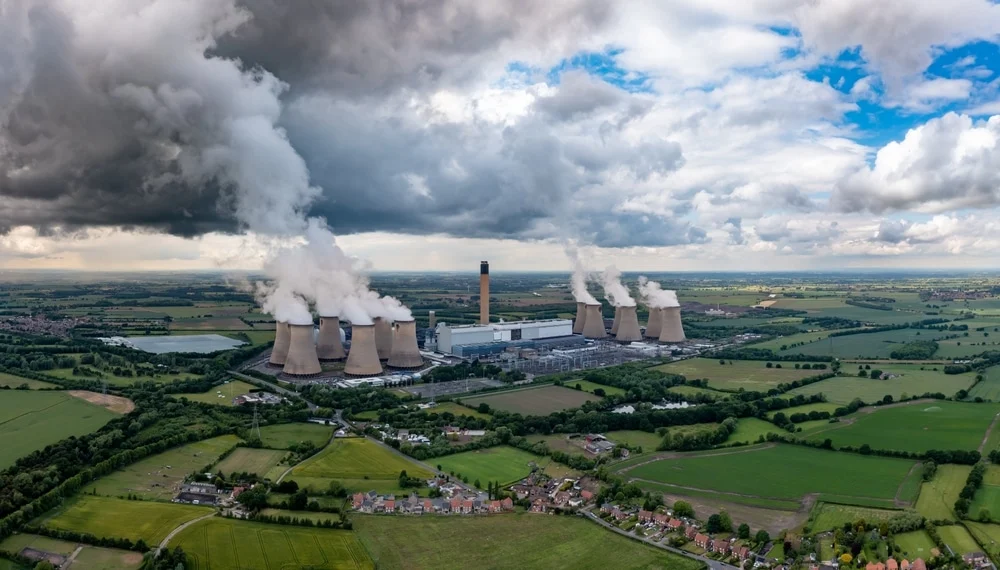The UK government carbon capture initiative took a major step forward on September 25, 2025, with the signing of Britain carbon storage contracts for two UK carbon capture projects.
These new carbon capture UK ventures, part of the commercial carbon capture UK landscape, are set to capture 1.2 million tonnes of CO₂ annually, marking a milestone in UK net zero projects.
Announced by the Department for Energy Security and Net Zero, these contracts will also drive carbon capture employment in the UK, creating around 500 skilled jobs in carbon capture roles to bolster Britain’s green economy.
The Projects: A Blueprint for Industrial Decarbonisation
The two UK CCUS projects (Carbon Capture, Utilization, and Storage) target emissions from industrial clusters in Teesside and Merseyside, key hubs for industrial carbon capture in Britain.
The first, led by BP-backed Net Zero Teesside, will capture CO₂ from power generation and industrial facilities, storing it beneath the North Sea.
The second, HyNet North West, focuses on hydrogen production and CO₂ emissions storage in the UK, leveraging existing gas infrastructure for secure sequestration.
Together, these projects align with the UK’s ambition to capture 20-30 million tonnes of CO₂ annually by 2030, a critical step toward net zero by 2050.
These UK carbon capture projects are not just about emissions; they’re about economic impact. The government estimates 500 direct jobs, from engineers to technicians, plus thousands more in supply chains, boosting skilled jobs in carbon capture in regions hit by industrial decline.
“This is a game-changer for our net zero journey and local economies,” a government spokesperson noted in a press release on September 25, 2025.
Why Carbon Capture Matters for the UK
The UK government carbon capture strategy addresses the challenge of decarbonising heavy industries like cement, steel, and chemicals, which account for 30% of UK emissions.
Traditional methods struggle to cut these emissions, but Commercial Carbon Capture UK offers a solution by trapping CO₂ at the source and storing it underground or repurposing it for fuels and materials.
READ ALSO:
How DBSA and Zero Carbon Charge Are Building SA’s First Off-Grid EV Highway
The Britain carbon storage contracts ensure long-term viability, with government-backed revenue models guaranteeing operators stable returns.
The new carbon capture UK projects build on earlier pilots, like the Drax BECCS plant, but scale up ambition.
Teesside and Merseyside will use advanced amine-based capture tech, achieving 95% CO₂ capture rates, and connect to shared pipeline networks for CO₂ emissions storage in the UK.
This infrastructure positions the UK as a global CCUS leader, attracting £8B in private investment since 2023.
Economic and Environmental Impact
The UK CCUS projects are a win-win for the environment and the economy. Capturing 1.2 million tonnes of CO₂ annually, equivalent to removing 260,000 cars from the road advances UK net zero projects.
Meanwhile, carbon capture employment in the UK creates high-value jobs, with training programmes targeting local workers in northern England.
HyNet alone expects to generate 200 jobs in Cheshire, while Net Zero Teesside will revitalise Redcar’s industrial base.
However, challenges remain. High upfront costs and energy-intensive capture processes raise concerns, though government subsidies and carbon pricing mitigate risks.
Critics also question storage safety, but rigorous North Sea monitoring systems ensure leaks are unlikely. The Britain carbon storage contracts include strict regulatory oversight to maintain public trust.
The Road Ahead for UK CCUS
The new carbon capture UK initiatives signal a maturing CCUS market. With £20B pledged for UK net zero projects by 2030, the government is eyeing four more clusters in Scotland and Humber.
The industrial carbon capture Britain push could unlock £5B in annual economic value, per a 2025 UKRI report, while positioning the UK as a hub for green tech exports. For investors, the commercial carbon capture UK sector offers stable, ESG-aligned opportunities.
As UK carbon capture projects scale, they pave the way for a cleaner, job-rich future.
Ronnie Paul is a seasoned writer and analyst with a prolific portfolio of over 1,000 published articles, specialising in fintech, cryptocurrency, climate change, and digital finance at Africa Digest News.
FAQs
Did the UK government sign carbon storage contracts?
Yes, the UK government signs carbon storage contracts for two UK carbon capture projects on September 25, 2025, to capture 1.2 million tonnes of CO₂ annually in Teesside and Merseyside.
How many jobs will UK carbon capture create?
The answer to how many jobs UK carbon capture will create is around 500 skilled jobs in carbon capture, with additional supply chain roles from Britain’s carbon storage contracts in industrial regions.
What are the new UK projects for carbon capture and storage?
The new UK projects for carbon capture and storage include Net Zero Teesside and HyNet North West, key UK CCUS projects targeting industrial carbon capture in Britain.
Did the government announce two new carbon capture projects?
Yes, the government announces two new carbon capture projects on September 25, 2025, advancing commercial carbon capture in the UK with 1.2 million tonnes of CO₂ captured yearly.
Will UK carbon capture create 500 jobs?
The UK carbon capture jobs target of 500 is confirmed, with carbon capture employment in UK roles in engineering and technical fields across UK net zero projects.
What are the details of new UK carbon storage contracts?
The details of new UK carbon storage contracts involve British carbon storage contracts for Net Zero Teesside and HyNet, storing CO₂ under the North Sea for CO₂ emissions storage in the UK.






